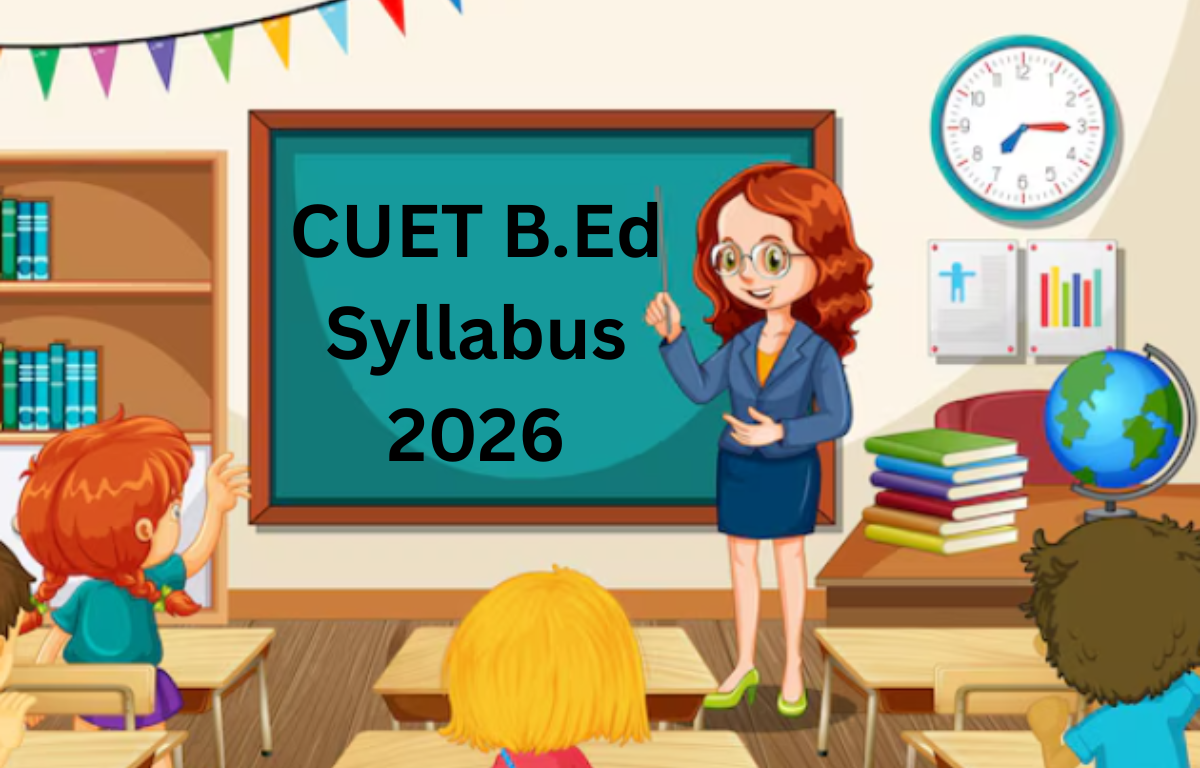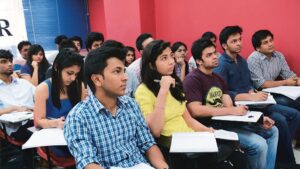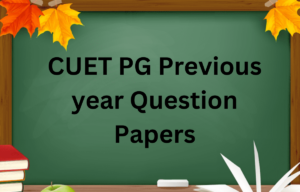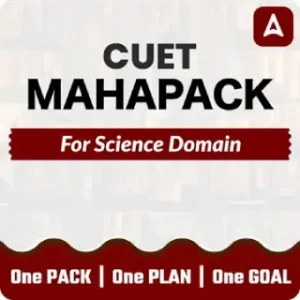Are you planning to become a teacher? Then, a BEd degree is your next step! To get into top universities for the B.Ed programme, you must clear the CUET PG 2026 exam. Though the CUET BEd syllabus 2026 is not out yet, it will soon be released by the National Testing Agency (NTA) in a PDF format.
This syllabus will help you understand what subjects to study and how to prepare. CUET offers B.Ed courses in various specialisations across well-known institutions. In this article, you’ll find all the latest updates about the CUET BEd syllabus 2026, important exam dates, subject-wise PDFs, and exam pattern. Stay tuned and get ready to shape your teaching dreams with CUET.
CUET B.Ed Syllabus 2026
Candidates who want to appear for the CUET BEd entrance exam 2026 should start by understanding the full syllabus. The CUET BEd 2026 syllabus helps students know what topics they need to study and practice. It usually includes subjects like General Knowledge, Teaching Aptitude, Language Comprehension, and for Science students, topics from Physics, Chemistry, and Biology. The syllabus may slightly differ based on the university offering the BEd course. By going through the BEd entrance syllabus 2026 PDF, students can prepare in the right direction and improve their chances of scoring well.
CUET PG BEd Detailed Syllabus
The CUET (PG) B.Ed syllabus is not yet officially released, but based on past trends, it typically encompasses areas like teaching‑learning processes, educational psychology, classroom communication, assessment methods, and current issues in education. The two-year B.Ed program itself focuses on preparing graduates for effective teaching by blending theory and practice.
It includes pedagogy for various school subjects, hands-on school internships, action research, and development of soft skills. Through lectures, workshops, and practicum components, students gain insights into curriculum design, inclusive education, leadership in schools, and effective classroom management, equipping them to thrive as future educators. As the new CUET syllabus for BEd has not been released yet, candidates can use the 2025 syllabus for guidance and start their preparation early.
CUET BEd Syllabus 2026 General Aptitude Test
Students planning to take the CUET BEd 2026 entrance exam in the Arts stream should check the previous year’s syllabus to get an idea of what topics may be covered. Going through the CUET BEd Arts syllabus helps you understand what subjects to focus on during preparation. It is the first and most important step to start your studies in the right direction.
- General Knowledge
- Logical and Analytical Reasoning
- Current Affairs
- General Mental Ability
- Reasoning (Quantitative arithmetic/algebra/statistics/geometry/mensuration)
- Numerical Ability
CUET BEd Syllabus 2026: Teaching Aptitude
The CUET BEd 2026 syllabus for Teaching Aptitude will soon be released by NTA on the official website – pgcuet.samarth.ac.in. Teaching Aptitude is one of the most important parts of the CUET BEd entrance exam. To prepare well, students should clearly understand what topics are included in this section. Once the CUET BEd 2026 syllabus is out, candidates will be able to download the PDF from this article. Until then, they can use the previous year’s syllabus to begin their studies and get an idea of what type of questions to expect in the exam.
CUET BEd Maths Exam 2025 Syllabus
| CUET BEd Maths Entrance Exam 2025 Syllabus | |
| Subject | Chapter |
| Mathematics | Relations and Functions – Relations and Functions, Inverse Trigonometric Functions Algebra – Matrices, Determinants
Calculus Continuity and Differentiability, Applications of Derivatives, Integrals, Applications of the Integrals, Differential Equations Vectors and Three-Dimensional Geometry – Vectors, Three-Dimensional Geometry Linear Programming – Linear Programming Probability – Probability |
| Statistics | Sequences and Series: Convergence of sequences of real numbers, Comparison, root and ratio tests for convergence of series of real numbers.
Differential Calculus: Limits, continuity and differentiability of functions of one and two variables. Rolle’s Theorem, mean value theorems, Taylor’s theorem, indeterminate forms, maxima and minima of functions of one and two variables. Integral Calculus: Fundamental theorems of integral calculus. Double and triple integrals, applications of definite integrals, arc lengths, areas and volumes. Matrices: Rank, inverse of a matrix. Systems of linear equations. Linear transformations, eigenvalues and eigenvectors. Cayley-Hamilton theorem, symmetric, skew-symmetric and orthogonal matrices. Differential Equations: Ordinary differential equations of the first order of the form y = f(x,y). Linear differential equations of the second order with constant coefficients. Descriptive Statistics and Probability: Measure of Central tendency, Measure of dispersion, skewness and Kurtosis, Elementary analysis of data. Axiomatic definition of probability and properties, conditional probability. multiplication rule. Theorem of total probability. Bayes’ theorem and independence of events. Random Variables: Probability mass function, probability density function and cumulative distribution functions, distribution of a function of a random variable. Mathematical expectation, moments and moment generating function. Chebyshev’s inequality. Statistics Standard Distributions: Binomial, negative binomial, geometric, Poisson, hyper- geometric, uniform, exponential, gamma, beta and normal distributions. Poisson and normal approximations of a binomial distribution. Chi-square distribution, t-distribution and F-distribution. Joint Distributions: Joint, marginal and conditional distributions. Distribution of functions of random variables. Product moments, correlation, simple linear regression. Limit Theorems: Weak law of large numbers. Central limit theorem (i.i.d. with finite variance case only). Estimation: Unbiasedness, consistency and efficiency of estimators, method of moments and method of maximum likelihood. Sufficiency, factorization theorem. Completeness, Rao-Blackwell and Lehmann-Scheffe theorems, and uniformly minimum variance unbiased estimators. Rao-Cramer inequality. Confidence intervals for the parameters of univariate normal, two independent normal, and one-parameter exponential distributions Testing of Hypotheses: Basic concepts, applications of the Neyman-Pearson Lemma for testing simple and composite hypotheses. Likelihood ratio tests. Sampling and Designs of Experiments: Simple random sampling, stratified sampling, and Cluster sampling. One-way, two-way analysis of variance. CRD, RBD, LSD, and 2 and 25 factorial experiments. |
CUET B.Ed Science Syllabus 2025
| CUET B.Ed Science Syllabus 2025 | |
| Subject | Chapters |
| Botany | Phycology and Microbiology, Biomolecules and Cell Biology, Mycology and Phytopathology, Archegoniate, Anatomy and Angiosperms, Economic Botany, Genetics, Molecular Biology, Plant Ecology and Phytogeography, Plant Semantics. Reproductive Biology of Angiosperms, Plant Physiology. Plant Metabolism, Plant Biotechnology |
| Zoology | Cell Biology, Biochemistry, Molecular Biology, Ecology, Evolution, Biodiversity & Environment Conservation, Immunology, Genetics, Bio techniques, Vertebrates and Invertebrates, Developmental Biology, Biostatistics, Animal Physiology. Recombinant DNA technology |
| Chemistry | Physical Chemistry
Gaseous State, Liquid State, lonic Equilibria, Solid State, Thermodynamics. Thermochemistry, Second Law, Third law of thermodynamics, Free Energy Functions, Partial molar quantities, Dilute solutions or Colligative Properties. Molecular Spectroscopy & Photochemistry, Chemical Kinetics, Catalysis, Surface chemistry, Phase Equilibria, Introduction to Quantum Chemistry, Conductance, Electrochemistry |
| Inorganic Chemistry
Atomic Structure, Periodicity of Elements, Chemical Bonding. Metallic bonding and Weak chemical forces, Oxidation-Reduction and general principle of metallurgy, Chemistry of s and p Block Elements, Noble Gases. Inorganic Polymers, Coordination Chemistry, Transition Elements, Lanthanides and Actinides, Bioinorganic Chemistry, Organometallic Compounds |
|
| Organic Chemistry
Basics of Organic Chemistry, Stereochemistry, Chemistry of Aliphatic Hydrocarbons, Carbon-Carbon sigma bonds. Carbon-Carbon pi-bonds, Cycloalkanes and Conformational Analysis, Aromatic Hydrocarbons, Chemistry of Halogenated Hydrocarbons, Alcohols, Phenols, Ethers and Epoxides, Carbonyl Compounds, Carboxylic Acids and their Derivatives. Sulphur containing compounds, Nitrogen Containing Functional Groups, Polynuclear Hydrocarbons, Heterocyclic Compounds, Alkaloids, Terpenes, Basic Principles of UV Spectroscopy, Basic principles of IR Spectroscopy, NMR (1 H and 13C NMR), Basic principles of Mass Spectrometry |
|
| Physics | Electrostatics, Current Electricity. Magnetic Effects of Current and Magnetism, Electromagnetic Induction and Alternating Currents, Electromagnetic Waves, Optics, Dual Nature of Radiation and Matter, Atoms and Nuclei, Electronic Devices |
| Home Science | Work, livelihood, and Career Nutrition, Food Science and Technology, Human Development and Family Studies, Fabric and Apparel, Resource Management, Communication and Extension |
| Computer Science | Computational Thinking and Programming, Computer Networks, Database Management |
CUET B.Ed Arts/Humanities and Social Science Syllabus 2025
| CUET B.Ed Arts/Humanities and Social Science Syllabus 2025 | |
| Subject | Chapters |
| History | Ancient History of India (10000 BC to 1206 AD), Early Medieval India (750 AD-1206 AD), Medieval History of India (1206-1707 AD), Modern History of India (1707 to 1947) |
| Political Science | Western Political Philosophy, Indian Political Thought, Political Theory, International Relations, Indian Government and Politics, Comparative Government and Politics, Public Policies in India, General issues of contemporary relevance |
| Geography | A) Physical Geography
Geomorphology, Climatology, Oceanography, Biogeography, Physical Geography of India B) Human Geography Geographic Thought, Population Geography, Geography of Resources, Economic Geography, Human Geography of India C) Geographical Techniques Cartography, Surveying Techniques, Statistical Techniques, Remote Sensing, and GIS |
| Economics | Micro Economics, Macro Economics, Money and Inflation, Consumption and Investment Function, Statistical Methods in Economics, Mathematical Methods in Economics, Indian Economy |
| Commerce | Microeconomics, Currency, and Banking. Essentials of Management, Office Management, Accounting, Business Organization, Statistical Methods, Public Finance, Business Law, Cost Accounting, Company law and Secretarial Practice, Selling and Advertising, Business Mathematics, Insurance Law and Accounts, Income Tax Law and Accounts, Contemporary Audit, Indian Economic Structure, Marketing. Practice and Finance, Macro-Economics. Trade of India, Applied & Business Statistics, Law and Practice of Banking, Development Banking, Quantitative Economics |
| Home Science |
|
CUET B.Ed Languages Syllabus 2025
| CUET B.Ed Languages Syllabus 2025 | |
| Subject | Chapters |
| Hindi |
|
| English |
|
| Sanskrit |
|
| Also Check | |
| CUET BEd Previous Year Question Papers | |
| CUET BEd Syllabus 2026 | |



 Best CUET Coaching in Delhi - Factors De...
Best CUET Coaching in Delhi - Factors De...
 Best CUET Coaching in Noida - Get Top 5 ...
Best CUET Coaching in Noida - Get Top 5 ...
 CUET PG Previous Year Question Papers wi...
CUET PG Previous Year Question Papers wi...












